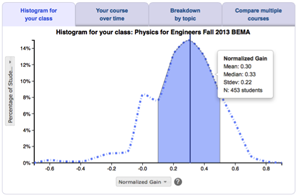
Developed by: Steven Pollock, Stephen Goldhaber, and many others in the University of Colorado Boulder PER group and physics department




middle schoolhigh schoolintro collegeinter-mediateupper levelgrad school other





Overview
What? Supplementary activities for upper-level Quantum I. Includes learning goals, interactive lectures, homework problems, student difficulties, tutorials, in-class group activities, and clicker questions. All materials are modular and can be mixed and matched with other teaching strategies or materials.
Classroom video
Student skills developed
- Conceptual understanding
- Problem-solving skills
- Using multiple representations
- Making real-world connections
- Metacognition
Instructor effort required
- Medium
Resources required
- TAs / LAs
- Clickers / polling method
- Projector
Resources
Teaching Materials
You can download all course materials for free, including lecture slides, clicker questions, homework, exams, and solutions from the developer's website on PhysPort.
You can download course materials for an updated version of the course, using a spins first approach, from the Adaptable Curricular Exercises for Quantum Mechanics page on PhysPort.
Research
This is the third highest level of research validation, corresponding to:
- at least 1 of the "based on" categories
- at least 1 of the "demonstrated to improve" categories
- at least 1 of the "studied using" categories
Research Validation Summary
Based on Research Into:
- theories of how students learn
- student ideas about specific topics
Demonstrated to Improve:
- conceptual understanding
- problem-solving skills
- lab skills
- beliefs and attitudes
- attendance
- retention of students
- success of underrepresented groups
- performance in subsequent classes
Studied using:
- cycle of research and redevelopment
- student interviews
- classroom observations
- analysis of written work
- research at multiple institutions
- research by multiple groups
- peer-reviewed publication
References
- G. Corsiglia, T. Garcia, B. Schermerhorn, G. Passante, H. Sadaghiani, and S. Pollock, Characterizing and monitoring student discomfort in upper-division quantum mechanics, presented at the Physics Education Research Conference 2020, Virtual Conference, 2020.
- G. Corsiglia, S. Pollock, and B. Wilcox, Effectiveness of an online homework tutorial about changing basis in quantum mechanics, presented at the Physics Education Research Conference 2022, Grand Rapids, MI, 2022.
- M. Dubson, S. Goldhaber, S. Pollock, and K. Perkins, Faculty Disagreement about the Teaching of Quantum Mechanics, presented at the Physics Education Research Conference 2009, Ann Arbor, Michigan, 2009.
- S. Goldhaber, S. Pollock, M. Dubson, P. Beale, and K. Perkins, Transforming Upper-Division Quantum Mechanics: Learning Goals and Assessment, presented at the Physics Education Research Conference 2009, Ann Arbor, Michigan, 2009.
- I. Hanemann, J. Hoehn, and N. Finkelstein, Characterizing differences in students' epistemologies between classical and quantum physics, presented at the Physics Education Research Conference 2018, Washington, DC, 2018.
- J. Meyer, G. Passante, S. Pollock, M. Vignal, and B. Wilcox, Investigating students’ strategies for interpreting quantum states in an upper-division quantum computing course, presented at the Physics Education Research Conference 2021, Virtual Conference, 2021.
- J. Meyer, G. Passante, S. Pollock, and B. Wilcox, Investigating student interpretations of the differences between classical and quantum computers: Are quantum computers just analog classical computers?, presented at the Physics Education Research Conference 2022, Grand Rapids, MI, 2022.
- G. Passante, P. Emigh, and P. Shaffer, Testing Tutorials in Upper-Division: An Example from Quantum Mechanics, presented at the Physics Education Research Conference 2014, Minneapolis, MN, 2014.
- K. Perkins and C. Turpen, Student Perspectives on Using Clickers in Upper-division Physics Courses, presented at the Physics Education Research Conference 2009, Ann Arbor, Michigan, 2009.
- S. Pollock, S. Chasteen, M. Dubson, and K. Perkins, The use of concept tests and peer instruction in upper-division physics, presented at the Physics Education Research Conference 2010, Portland, Oregon, 2010.
- S. Pollock, H. Sadaghiani, A. Quaal, and G. Passante, Designing, validating, and contrasting conceptual quantum mechanics questions for spin states and spatial wave functions, presented at the Physics Education Research Conference 2018, Washington, DC, 2018.
- S. Pollock and B. Wilcox, Upper-Division Students' Use of Separation of Variables, presented at the Physics Education Research Conference 2015, College Park, MD, 2015.
- H. Sadaghiani, J. Miller, S. Pollock, and D. Rehn, Constructing a Multiple-choice Assessment for Upper-division Quantum Physics from an Open-ended Tool, presented at the Physics Education Research Conference 2013, Portland, OR, 2013.
- H. Sadaghiani, G. Passante, and S. Pollock, Student understanding of quantum mechanical expectation values in two different curricula, presented at the Physics Education Research Conference 2018, Washington, DC, 2018.
- H. Sadaghiani and S. Pollock, Quantum mechanics concept assessment: Development and validation study, Phys. Rev. ST Phys. Educ. Res. 11 (1), 010110 (2014).
- B. Schermerhorn, A. Villasenor, D. Agunos, H. Sadaghiani, G. Passante, and S. Pollock, Student perceptions of math-physics interactions throughout spins-first quantum mechanics, presented at the Physics Education Research Conference 2019, Provo, UT, 2019.
- J. Wells, H. Sadaghiani, B. Schermerhorn, S. Pollock, and G. Passante, Deeper look at question categories, concepts, and context covered: Modified module analysis of quantum mechanics concept assessment, Phys. Rev. Phys. Educ. Res. 17 (2), 020113 (2021).
- B. Wilcox, M. Caballero, C. Baily, H. Sadaghiani, S. Chasteen, Q. Ryan, and S. Pollock, Development and uses of upper-division conceptual assessments, Phys. Rev. ST Phys. Educ. Res. 11 (2), 020115 (2015).
- B. Wilcox and S. Pollock, Upper-division student difficulties with the Dirac delta function, Phys. Rev. ST Phys. Educ. Res. 11 (1), 010108 (2015).




